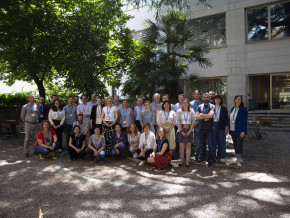Trans-planetary Visionist
Imagine a world with a global consciousness, where mobility of ideas, information and people have launched humanity into a new ideological paradigm based on redistributed social justice. Sounds like a nice place to be, and that’s exactly the type of ‘global imaginary’ that Manfred B. Steger, Professor of Global and Transnational Sociology at the University of Hawaii-Mānoa, thinks we can achieve. The celebrated author of “Globalism: A Very Short Introduction” was at Eurac Research in May to talk about alternative global paradigms and the rise of the populist Right.
Professor Steger, can you please start by giving us a ‘Very Short Introduction’ of how has globalism evolved since the 1990s?
Manfred Steger: I see three articulations of what I call ‘the global imaginary’, a term that basically refers to a global consciousness and a global sense of belonging. These three articulations have occurred in three phases: ‘Market Globalism’ began in the early 1990s and spoke to an increasingly interdependent and interconnected world in terms of global free market integration. It came to an end with the trade demonstrations around the world, and of course, 9/11. The second phase started in the early 2000s. One part of it was a challenge to Market Globalism by the Left called ‘Justice Globalism’, which was based on the redistribution of social justice, a strong sense of ecological protection, and the peace movement. During the same period, on the Right, a new global religious paradigm called ‘Religious Globalism’ emerged and manifested itself in multiple religions, of which Islam was perhaps most spectacular in terms of Al-Qaeda and later ISIS. Finally, in phase three, which began with the financial crisis in 2008 and is still ongoing today, Market Globalism gets into in real trouble. In fact, there was an opportunity for Justice Globalism to articulate their alternative in more effective terms at this time, but it has been anti-globalist populists that have captured the discursive space. Theirs is an articulation of a ‘National Imaginary’, which is an understanding of community in national terms.
Why did Justice Globalism movements such as ‘Occupy’ misfire?
Steger: There are many reasons Occupy didn’t work, but here are three to start: First, institutionally and structurally it was not sound. It was based on philosophically attractive anarchist principles such as the General Assembly and the Unanimous Consent framework, but institutionally there was little work being done to find new institutional expressions and to forge alliances. Secondly, the Tea Party movement in US capitalised on the ‘cultural cleavage’ in America with regard to immigration and mobility. They were very successful at tapping into the three ‘A’s of Anger, Alienation and Anxiety, which they articulated attractively to those people who saw themselves as the losers of Market Globalism. Thirdly and finally, there was a sense of real disappointment in the Obama administration. Obama was touted as the new Franklin Delano Roosevelt. He was a global figure who appealed even to those in the Middle East. Yet in the end, he was just as tied up in Wall Street--no one went to jail after the crash of 2008, it was politics as usual, and the major underlying policies from the Bush administration weren’t changed. So there was a real disappointment and a sense that the Left was not capable of bringing about change.
With this failure of the Left, the ongoing ecological damage and economic inequalities caused by the free market, and the current rise of anti-globalist populism around the world, is there any hope for globalism as an ideology?
Steger: There are still many positives: first, globalism is about mobility, not just of goods and services, but of open borders—a philosophical sense of people and things and ideas being able to flow with minimal obstruction. I think mobility is written in our DNA. I think we are a species that only survives and exists by our tremendous ability to move around, and globalism facilitates mobilities of all kinds. The second is cosmopolitanism: a trans-planetary consciousness means a sense of the local connected to the global. These are not opposites, as they are often portrayed by anti-globalist populists. It is the idea of ‘Glocalism’. Cosmopolitanism is not about some abstract connection to the planet, but about being embedded in local context, and at the same time being aware of the world and its interdependence. The third positive is about our ability to take “the next step” as a species, both materially and in terms of ideas. Humans are at a place in their development where they are reaching real planetary limitations. It requires what some describe as a “global systemic shift”. I believe that in order to make that shift, a globalist path is absolutely necessary: as humans, we have to find new energy sources, new ways of educating people, we have to think about inequalities, security issues… wherever you turn you will need a globalist consciousness to get over those hurdles.
With the rise of the populist Right in Europe as evidenced in the recent EU elections in which the right gained just over 30% share of the vote in Italy and Britain while Hungary’s Fidesz won 52%, how can globalists take back that ‘discursive space’ you mentioned?
Steger: I think it requires the Left to rethink some of its fundamental assumptions. The best way for them to deal with this crisis is not to try to steal the strong suit from the Right, and return to some kind of Keynesian National Imaginary, but to propose an alternative vision for the global imaginary. For the European Union, this alternative can be found by playing up the advantages of mobility, the advantages of interconnectivity, the advantages of a regional block that is based upon higher degrees of interconnectivity and interdependence. That’s a tall order, but I think it can only go in that direction—make a very good argument in favour of integration.
Mobility is written in our DNA. We are a species that only survives and exists by our tremendous ability to move around, and globalism facilitates mobilities of all kinds.
Is this an ideological struggle against Right-wing populists?
Steger: One of the biggest challenges for the Left is to stand up to populists in this battle over defining globalization. Populists base their paradigm on a deeply-rooted assumption that mobility is bad thing: “Let’s keep borders. Let’s keep silos. Let’s not change too much, and possibly if we get rid of immigrants and bring some of those old jobs back everything will be fine.” It’s a bias in favour of a static social imaginary.
So far the justice globalist vision based on redistribution of social justice and market regulation seems not to have taken hold of populations Europe. What would you suggest as an alternative route?
Steger: For justice globalists, there are two parts to the path: one is always ‘Ideas’ and the other is always ‘Institutions’, and they always go together. You can’t have effective ideas without institutional infrastructure, and you can’t build institutional infrastructure without the people that are willing to buy into appealing ideas. It’s a kind of chicken-egg problem, but you have to start with both.
What are those ideas that the Left can use to inspire institutions?
Steger: Globalists must put mobility at the front burner. It has to show the importance, for example, of learning languages, of being able to travel, of digital mobility and digital literacy--the technological paradigm which is based on mobility of ideas and information. They need to say they stand for mobility with regards to ideas, culture, music--exchanges where technological infrastructure is needed. The Left has to lay out how integration works in ways in which people don’t feel threatened to the extent they are now. That’s where I would start.
Related Articles

Tecno-prodotti. Creati nuovi sensori triboelettrici nel laboratorio di sensoristica al NOI Techpark
I wearable sono dispositivi ormai imprescindibili nel settore sanitario e sportivo: un mercato in crescita a livello globale che ha bisogno di fonti di energia alternative e sensori affidabili, economici e sostenibili. Il laboratorio Sensing Technologies Lab della Libera Università di Bolzano (unibz) al Parco Tecnologico NOI Techpark ha realizzato un prototipo di dispositivo indossabile autoalimentato che soddisfa tutti questi requisiti. Un progetto nato grazie alla collaborazione con il Center for Sensing Solutions di Eurac Research e l’Advanced Technology Institute dell’Università del Surrey.

unibz forscht an technologischen Lösungen zur Erhaltung des Permafrostes in den Dolomiten
Wie kann brüchig gewordener Boden in den Dolomiten gekühlt und damit gesichert werden? Am Samstag, den 9. September fand in Cortina d'Ampezzo an der Bergstation der Sesselbahn Pian Ra Valles Bus Tofana die Präsentation des Projekts „Rescue Permafrost " statt. Ein Projekt, das in Zusammenarbeit mit Fachleuten für nachhaltiges Design, darunter einem Forschungsteam für Umweltphysik der unibz, entwickelt wurde. Das gemeinsame Ziel: das gefährliche Auftauen des Permafrosts zu verhindern, ein Phänomen, das aufgrund des globalen Klimawandels immer öfter auftritt. Die Freie Universität Bozen hat nun im Rahmen des Forschungsprojekts eine erste dynamische Analyse der Auswirkungen einer technologischen Lösung zur Kühlung der Bodentemperatur durchgeführt.

Gesunde Böden dank Partizipation der Bevölkerung: unibz koordiniert Citizen-Science-Projekt ECHO
Die Citizen-Science-Initiative „ECHO - Engaging Citizens in soil science: the road to Healthier Soils" zielt darauf ab, das Wissen und das Bewusstsein der EU-Bürger:innen für die Bodengesundheit über deren aktive Einbeziehung in das Projekt zu verbessern. Mit 16 Teilnehmern aus ganz Europa - 10 führenden Universitäten und Forschungszentren, 4 KMU und 2 Stiftungen - wird ECHO 16.500 Standorte in verschiedenen klimatischen und biogeografischen Regionen bewerten, um seine ehrgeizigen Ziele zu erreichen.

Erstversorgung: Drohnen machen den Unterschied
Die Ergebnisse einer Studie von Eurac Research und der Bergrettung Südtirol liegen vor.
